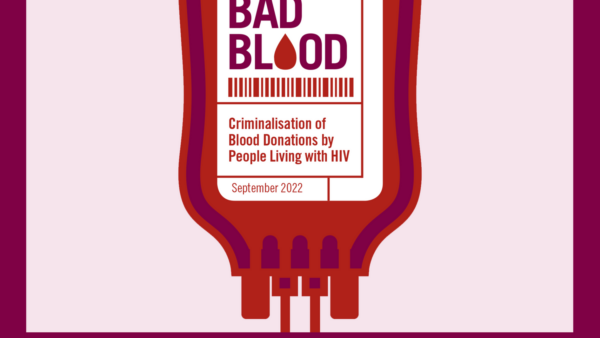Overview
There have been more than 20 HIV criminalisation cases in Singapore, with the first known case occurring in 2000. The majority of cases to date have applied section 23 of the Infectious Diseases Act, which is an HIV-specific provision. In most cases, the accused (all of them men) have pled guilty.
Section 23 of the Infectious Diseases Act states that a person who knows they have HIV or has reason to believe they have been exposed to a significant risk of acquiring HIV, must not engage in any sexual activity with another person without informing the person that they have (or may have) HIV. The person living with HIV must also tell their prospective partner of the risk of contracting HIV before the sexual activity takes place. The law then acknowledges that if both actions occur, a sexual partner may voluntarily agree to the risk. It also provides a defence for people who are not yet diagnosed but suspect they may have been exposed to a significant risk if they take reasonable precautions to ensure they do not expose their partner to risk of HIV. There are is no such defence for people confirmed to be living with HIV.
In 2024, following a government review, an additional defence was added to reflect the lack of risk of transmission where the person living with HIV has an undetectable viral load. This now acts as a full defence against prosecution under section 23 providing that the person has a test result proving that they have achieved undetectable status, has adhered to medical treatment since that result, and has not subsequently received a test result indicating they are again detectable. However, using condoms continues not to be a defence.
The structure of the law, which initially focussed on disclosure of diagnosed HIV-positive status regardless of transmission risk, has resulted in convictions where condoms have been used and where a person has an undetectable viral load. For example, in 2012, two men living with HIV were jailed after having casual sex (at different times) with a man who subsequently tested positive for HIV. One of the accused had oral sex (without condoms) and anal sex (with condoms) and had an undetectable viral load. The second accused had been the receptive partner and had testified that the complainant had worn a condom. The complainant did not confirm whether or not he had used a condom. Despite it being unclear how the man acquired HIV, and the actions of the men including no transmission risk, both were convicted.
Similarly, in 2019 a man was sentenced to 19 months’ jail and a $2,500 fine for not disclosing his HIV status to two women before having sex with them during a period he had been taking HIV medication and had had a low/undetectable viral load. In that case the man had contacted the health ministry to make them aware of the circumstances of his case, explaining his concern that a condom had broken during sex with one of the women. Investigators then found that the man had met the women during a process of renting out an apartment they used for sex work. The man was also convicted of one count of living off the earnings of prostitutes and one charge of letting his rental unit be used as a brothel. In a November 2022 case a man was charged with a pleaded guilty to the non-disclosure offence after having sex with two partners who were unaware of his status. The report suggests that he had an undetectable viral load at the time of at least one, and possibly both, of the sexual encounters, and had even given his partners PrEP. He was nonetheless sentenced to 15 months’ imprisonment.
In July 2019, Singapore’s High Court confirmed that people living with HIV must both disclose their HIV-positive status prior to sex, and they must inform them of the possible risk of HIV transmission. The case related to an appeal by an HIV-positive man convicted for non-disclosure before a number of sexual encounters with a male partner. The sexual partner tested HIV-positive, but it was not known how he had acquired it. The case is concerning for a number of reasons. Firstly, it is not clear that the accused did not disclose his HIV status. The complainant had initially testified that the man withheld information about his HIV status, but he later conceded that the man may have mentioned his HIV status while they were chatting through an app. Instead of casting doubt on the complainant’s testimony, the judge decided that having forgotten some exchanges showed that he was a “candid witness”. Secondly, the judgement suggests that there was no effective HIV risk during the sexual activity. Condoms were used early in the relationship, and subsequently when condoms were not used, the accused had a very low viral load. The judge sentenced the accused to a two-year jail term, also establishing a three-band sentence range for first-time offenders who plead not guilty and go to trial ranging from a fine to a 10-year jail term, with a starting point of a six year jail term when actual harm results.
Another case in June 2022 highlights the severity of Singapore’s HIV law and the lack of consideration given to transmission risk by the courts. In this case, a man was sentenced to one year imprisonment for failure to disclose his HIV status prior to sexual activity on two occasions despite being on medical treatment which had resulted in an undetectable viral load, and as verified by doctors at trial, no risk of transmission. This case was met with some criticism and calls for reform of the law in the media (see here and here). A case in 2023 involving a transgender sex worker resulted in four charges for sexual intercourse with clients without disclosing their HIV status. While at least one of these incidents was unprotected and resulted in HIV transmission, others involved condoms or an undetectable viral load. They were ultimately sentenced to three years and three months’ imprisonment after pleading guilty to one charge.
Singapore has also had a case involving a man who had not been diagnosed but was found liable after allegedly being exposed to a significant risk of acquiring HIV and not taking precautions to protect others. The Malaysian man had been contacted numerous times by the health department informing him that sexual partners had tested positive for HIV at which time he had falsely claimed to have been tested or had avoided contact from the health department. The man was sentenced to 42 months jail.
In addition to section 23, the Infectious Diseases Act contains other provisions which have been used to prosecute people living with HIV. Section 24 specifically prohibits people who know they are living with HIV from making a blood donation, with a maximum sentence of 10 years’ imprisonment and/or a fine. Furthermore, section 11 of the Act makes it an offence, liable to up to two years’ imprisonment and/or a fine, to knowingly supply false information in connection with a blood donation (see our report, Bad Blood, for a global analysis of the criminalisation of blood donations). We are aware of several HIV cases related to blood donations in Singapore, making it the global hotspot for use of such laws.
In a case in 2021, a man who was unknowingly living with HIV was charged under section 11 for allegedly lying about his sexual history when he donated blood in an effort to help increase blood supplies during the COVID-19 pandemic. The man declared in his Donor Health Assessment Questionnaire, a legal document that must be signed prior to donating blood, that he had never had sex with another man. He later confirmed his answers were truthful when asked by a doctor. After his blood later tested positive for HIV, the man told a doctor that he had previously had oral sex with a man but that he did not think this was considered ‘sex’, having overlooked the first page of the questionnaire which defined ‘sex’ as including oral sex. Following arrest the man pleaded guilty to the offence, but his plea was rejected by the judge on the basis that he did not know at the time that the information he was providing was false. The charges were eventually dropped.
In another case reported in 2021, a man was sentenced to three months’ imprisonment and a fine of S$10,000 after being found guilty under section 11. When donating blood in 2019 the man declared in his Donor Health Assessment Questionnaire that he had never had sex with another man and that he had not had a body piercing in the previous year. After tests on the donated blood and later himself showed that he was HIV-positive, the man admitted that his declarations were untrue and he was prosecuted under the Infectious Diseases Act. Similar cases reported in May 2023 and March 2024 also resulted in three month prison sentences for failure by men living with HIV to disclose past sexual experiences with men during blood donations.
‘Exposure’ to HIV may also result in enhanced sentences for general harm offences. In a case reported in March 2023, a man living with HIV was convicted for allegedly biting a police officer during a raid, with his HIV status used to justify a 20-month prison sentence. On appeal the sentence was reduced to 14 months, as evidence demonstrated there was not a risk of significant harm from the bite. While the conviction was upheld, it is not clear which provision was used to prosecute. Similarly, in a case reported in July 2023, a man living with HIV received a five month prison sentence after allegedly biting a police officer during a struggle. The officer was deemed at low risk of infection, however the court nonetheless added jail time for the bite to a wider list of drug-related charges.
In an interesting case reported in July 2024, a man was found criminally liable for coercing his wife into sex work without disclosing her HIV status to her clients. The woman complied due to financial concerns and coercion. It is not clear if she was charged with a non-disclosure offence, however the man, who was also living with HIV, was sentenced to one year and eight months’ imprisonment for four charges, including solicitation.
Although there have been no reported cases using these laws to date, in theory Singapore’s Penal Code has two provisions which could be used to address HIV exposure or transmission. Section 269 states that unlawfully or negligently undertaking an act likely to spread an infection dangerous to life is punishable by 1 year’s imprisonment and/or a fine. Section 270 increases the penalty to up to four years and/or a fine when the act is a ‘malignant act’. In both cases, the offence includes not only a person knowing the act is likely to transmit HIV, but also having ‘reason to believe’ the act is likely to transmit HIV; effectively lowering the threshold for a charge to be laid in line with the provisions in Singapore’s Infectious Diseases Act.
Intention to transmit HIV or to cause harm are not required in the case of negligence (s269). Disclosure of HIV-positive status prior to sexual intercourse, and informed consent by the HIV-negative party are also not addressed. A number of other issues are not included in the legislation but could be considered during a trial. These include whether a specific act was ‘likely’ to result in transmission (including consideration of risk reduction practices); whether a person knew or had reason to believe the act was likely to result in transmission (whether or not their knowledge or belief reflected current scientific understanding); and whether, given modern treatments, HIV can still be considered a virus dangerous to life in the case in question.
Laws
Infectious Diseases Act 1977
Section 23. Sexual activity by person with AIDS or HIV Infection
(1) A person who knows that he has AIDS or HIV Infection shall not engage in any sexual activity with another person unless, before the sexual activity takes place
(a) he has informed that other person of the risk of contracting AIDS or HIV Infection from him; and
(b) that other person has voluntarily agreed to accept that risk.
(1A) Subsection (1) does not apply to a person who knows that he or she has HIV infection if he or she has maintained an undetectable HIV viral load for at least the prescribed period preceding the sexual activity in question.
(1B) A person is presumed, unless the contrary is proved, to have maintained an undetectable HIV viral load for at least the prescribed period preceding the sexual activity in question if he or she:
(a) has taken a test within a prescribed period before the sexual activity and obtained a test result issued by a recognised laboratory showing that the person has an undetectable HIV viral load;
(b) has taken an earlier test no later than a prescribed amount of time before the test mentioned in paragraph (a) and obtained a test result issued by a recognised laboratory showing that the person has an undetectable HIV viral load;
(c) at no time, during the period between the test mentioned in paragraph (b) and the sexual activity in question, has taken a test and obtained a test result issued by a recognised laboratory showing that the person has a detectable HIV viral load; and
(d) has adhered to his or her medical treatment for HIV infection as prescribed by his or her medical practitioner, during the period starting on the date he or she takes the test mentioned in paragraph (b) up to and including the date of the sexual activity in question.
(1C) For the purposes of subsection (1A):
(a) a person has a detectable HIV viral load if the amount of HIV detected in a test carried out for the purpose of ascertaining his or her HIV viral load is at or above the level prescribed by regulations; and
(b) a person has an undetectable HIV viral load if the amount of HIV detected in a test carried out for the purpose of ascertaining his or her HIV viral load is below the level prescribed by regulations.
(2) A person who does not know that he has AIDS or HIV Infection, but who has reason to believe that he has, or has been exposed to a significant risk of contracting, AIDS or HIV Infection shall not engage in any sexual activity with another person unless —
(a) before the sexual activity takes place he informs that other person of the risk of contracting AIDS or HIV Infection from him and that other person voluntarily agrees to accept that risk;
(b) he has undergone the necessary serological or other test and has ascertained that he does not have AIDS
(c) during the sexual activity, he takes reasonable precautions to ensure that he does not expose that other person to the risk of contracting AIDS or HIV Infection.
(3) Any person who contravenes subsection (1) or (2) shall be guilty of an offence and shall be liable on conviction to a fine not exceeding $50,000 or to imprisonment for a term not exceeding 10 years or to both.
(4) For the purposes of this section, a person shall not, only by reason of age, be presumed incapable of engaging in sexual activity.
(5) For the purposes of this section, a person shall be deemed to know that he has AIDS or HIV Infection if a serological test or other test for the purpose of ascertaining the presence of HIV Infection carried out on him has given a positive result and the result has been communicated to him.
(6) No prosecution shall be instituted for an offence under subsection (2) except with the written consent of the Public Prosecutor, but a person charged with such an offence may be arrested and be remanded in custody or released on bail notwithstanding that the consent of the Public Prosecutor to the institution of a prosecution for the offence has not been obtained, except that the case shall not be further prosecuted until that consent of the Attorney-General has been obtained.
(7) In this section, “sexual activity” means —
(a) sexual activity occasioned by the introduction into the vagina, anus or mouth of any person of any part of the penis of another person; or
(b) cunnilingus.
Section 24. Blood donation and other acts by person with HIV Infection
(1) Any person who knows that he has HIV Infection shall not —
(a) donate blood at any blood bank in Singapore; or
(b) do any act which is likely to transmit or spread HIV Infection to another person.
(1A) For the purposes of this section, a person shall be deemed to know that he has HIV Infection if a serological test or other test for the purpose of ascertaining the presence of HIV Infection carried out on him has given a positive result and the result has been communicated to him.
(2) Any person who contravenes subsection (1) shall be guilty of an offence and shall be liable on conviction to a fine not exceeding $50,000 or to imprisonment for a term not exceeding 10 years or to both.
Infectious Diseases Act 1977
Section 11. Offence for supplying false or misleading information
(1) Any person who —
(a) donates any blood or blood product at any blood bank or hospital in Singapore for any use or purpose; and
(b) directly in connection with such donation of blood or blood product, supplies any material information which he knows to be false or misleading,
shall be guilty of an offence and shall be liable on conviction to a fine not exceeding $20,000 or to imprisonment for a term not exceeding 2 years or to both.
(2) In this section, “material information” means any information directly relating to the likelihood of transmission of an infectious disease by the use of any blood or blood product.
Penal Code
Section 269. Negligent act likely to spread infection of any disease dangerous to life
Whoever unlawfully or negligently does any act which is, and which he knows or has reason to believe to be, likely to spread the infection of any disease dangerous to life, shall be punished with imprisonment for a term which may extend to one year, or with fine, or with both.
Section 270. Malignant act likely to spread infection of any disease dangerous to life
Whoever malignantly does any act which is, and which he knows or has reason to believe to be, likely to spread the infection of any disease dangerous to life, shall be punished with imprisonment for a term which may extend to 4 years, or with fine, or with both.
Acknowledgements
Our thanks to Australian law firm Hall & Wilcox for their research assistance to confirm current relevant legislation.
HIV Justice Network's Positive Destinations
Visit the Singapore page on Positive Destinations for information on regulations that restrict entry, stay, and residency based on HIV-positive status, as well as access to HIV treatment for non-nationals.












